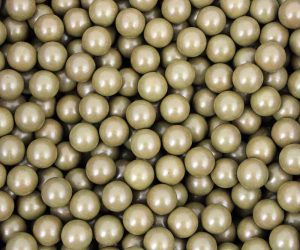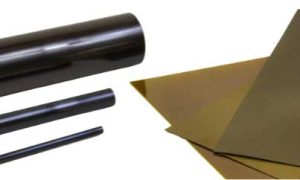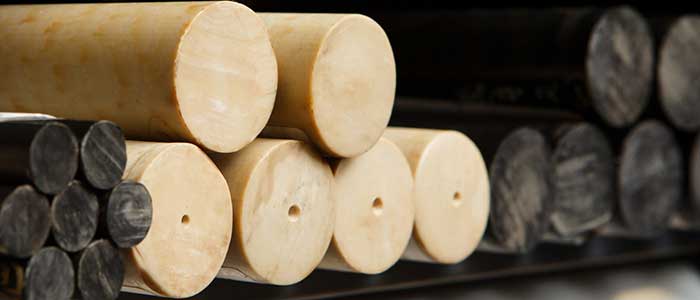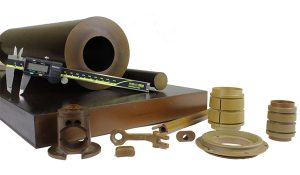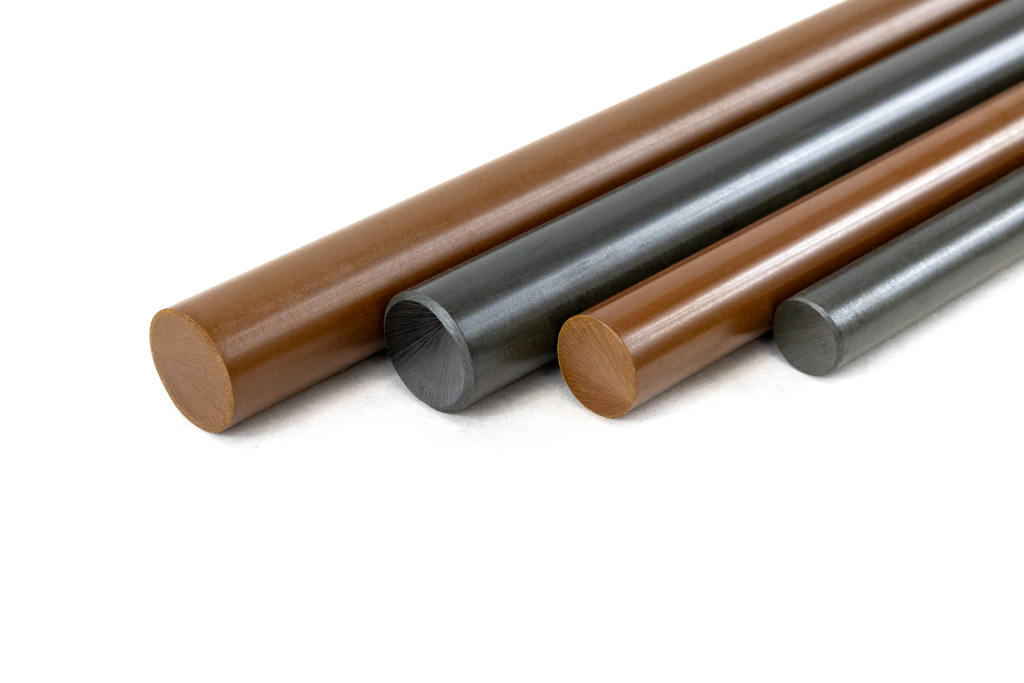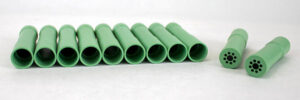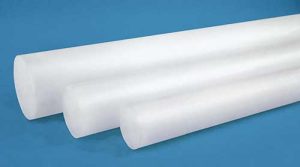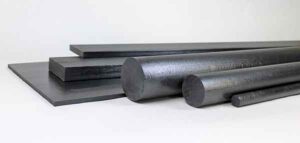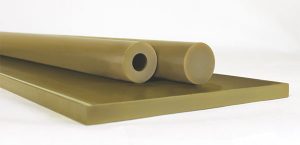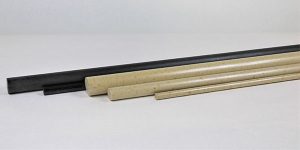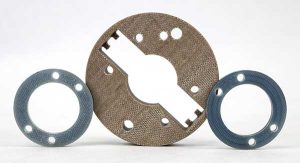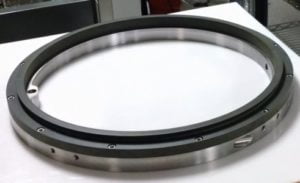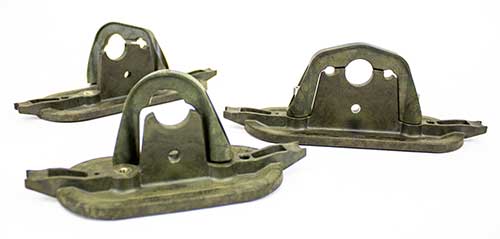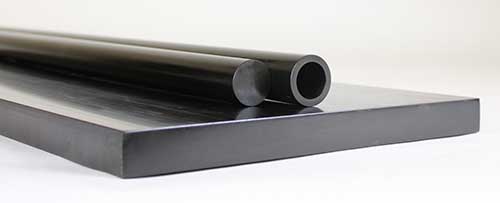Torlon 7130 is a high-performance formulation within the polyamide-imide (PAI) family of polymers. Its physical properties and bearing and wear resistance serve extremely demanding applications. These applications include components for equipment and systems used in the following high-technology industries:
- Aerospace
- Automotive and transportation
- Oil and gas
- Chemical processing
- Industrial machinery
- Medical prostheses
Torlon 7130 is distinguished by the additive content of 30 percent carbon fiber in its formulation. This fiber reinforcement imparts higher tensile strength and significantly more flexural modulus to the PAI polymer. The properties achieved by the addition of the carbon fiber reinforcement make Torlon 7130 ideal for applications that must retain high structural strength and stability at elevated temperatures.
Typical Applications of Torlon 7130
Several service applications for Torlon 7130 can be found in equipment and systems used by high technology industries globally. These industries include:
-

Injection molded tube supports for a spacecraft’s hydraulic system capitalize on the strength of Torlon 7130 at both high and low temperature extremes. Aerospace – Torlon 7130 is processed into a number of aerospace parts that require uncompromised strength and stiffness over wide variations in temperature. It maintains a higher level of its impact resistance at cryogenic temperatures compared to many other thermoplastics, an important benefit for the growing number of applications in spacecraft. Typical applications include structural components, gears, bearings and bushings that are exposed to extreme levels of static and dynamic load bearing stresses. Torlon 7130 also meets the flammability and smoke generation requirements for components used in aerospace equipment and is rated UL 94 V0 by UL.
-
Automotive and transportation – Torlon 7130 is often specified for race car components to improve reliability under high dynamic loads, vibration and structural stresses. The material is also used for machined and injection molded transmission and engine parts, including thrust washers and gears where long-term performance and dependability are essential to the vehicle manufacturer’s reputation.
-
Oil and gas – Torlon 7130 is typically the material of choice for high-wear, high-temperature and high-corrosion environments that are beyond the capabilities of most other thermoplastics. Downhole, Torlon 7130 is well-established as a dependable replacement for metals, with performance that lengthens the service life and maintenance cycles of valves, gaskets and seals used in drilling, pumping and processing equipment.
- Chemical processing – Like all Torlon grades, Torlon 7130 withstands exposure to a wide range of chemicals and is used for impellers and vanes used in pumps that serve various functions including piping systems that transfer chemicals during processing.
- Industrial manufacturing – With its 30 percent carbon fiber reinforcement, high-strength Torlon 7130 couples wear resistance with structural and load-bearing capabilities at elevated temperatures. These properties are especially beneficial for bushings and bearings used in robotics, metal stamping and forming, and various other types of production machinery.
- Medical prostheses – Because of its high structural strength, carbon fiber reinforced Torlon 7130 has been used successfully as a lighter alternative to metal and thermosets for prosthetic device bushings and components.
How Does Torlon 7130 Compare to Unfilled Torlon?
Torlon 7130’s carbon reinforcement boosts its tensile strength and flexural modulus beyond that of unreinforced grades of Torlon, such as Torlon 4203. However, both the reinforced and the unfilled grades are widely used for similar components depending on the physical property requirements that are dictated by the application environment. How do the two grades compare?
- Structural Strength – Compared to unfilled grades, Torlon 7130 is defined by the superior structural rigidity that its glass fiber reinforcement adds to the polymer. Specifically, the flexural modulus of Torlon 7130 is well over three times that of Torlon 4203 at ambient temperatures and more than four times greater at 232°C.
- Chemical resistance – Both Torlon 7130 and Torlon 4203 exhibit excellent chemical resistance to a variety of hydrocarbons, acids, bases and solvents. Unfilled grades of Torlon tend to perform slightly better in highly corrosive environments.
- Engineering note: As with any material, components made from Torlon 7130 should be tested for compatibility with the chemicals at the temperatures, loads and other variables specific to each application.
-

Torlon 7130 can be injection molded into parts, and extruded into semi-finished shapes that are machined into precision components. Thermal properties – Torlon 7130 and Torlon 4203 have nearly identical thermal stability with glass transition temperatures (Tg) of 537°F (280°C). Both the reinforced and unfilled Torlon grades excel among engineering polymers in maintaining physical properties and stability at high temperature extremes as well as in cryogenic environments.
-
Electrical properties – Torlon 4203 possesses better electrical properties including dielectric strength than Torlon 7130, due to the carbon fiber content of the 7130 grade. As a result, manufacturers typically choose unfilled Torlon for electrical components.
- Processability – Due to its high carbon fiber content, Torlon 7130 is more difficult to process than Torlon 4203, regardless of the conversion method. Specialized melt-processing and process control equipment tuned to the material will provide parts with highly consistent physical properties and quality.
In summary, Torlon 7130 is recommended for applications where load-bearing and structural properties are priorities, whereas Torlon 4203 offers better economy and electrical properties.
How an Experienced Polymer Processor Can Achieve the Targeted Performance in Components Made from Torlon 7130
Torlon 7130 is a high-performance polymer that can withstand extreme environments, but it poses challenges in processing into extruded stock shapes and into injection molded components. Ensuring consistent quality and optimum physical properties requires specialized equipment that is adapted to the melt characteristics of the Torlon 7130 formulation. Examples of the specialized elements of a robust process system for the material include:
- Melt flow analysis lab equipment to characterize the resin and ensure the process equipment is suitable or can be modified to achieve optimum conditions.
- Screw, barrel and nozzle tuned to Torlon 7130’s melt characteristics.
- Process control equipment that can monitor melt temperatures and pressures and automatically make immediate adjustments as needed.
- Because the material is hydroscopic, it must be dried prior to processing, and kept dry during processing. The resin manufacturer recommends drying conditions of 177o C / 350o F for 3 hours. This can vary depending on the manufacturing environment.
- Ideally, dryers dedicated to the resin should be used to avoid cross-contamination with other polymers.
- Prompt and complete purging and thorough cleaning of all components in contact with the melted Torlon 7130 resin during processing should be done, to prevent residual material that can degrade and contaminate resin on subsequent runs.
- Extruded shapes and injection molded parts melt-processed from all Torlon grades including Torlon 7130 must be post-cured in precise stages up to 260oC / 500oF to complete the imidization of the PAI polymer and achieve optimum physical properties. Post-curing also significantly improves the bearing and wear resistance of both injection molded and machined parts.
In addition to these requirements for effective melt-processing, expertise in machining Torlon 7130 from extruded shapes can help assure that the parts are made with the carbon fibers oriented so that they deliver the highest levels of strength where it is most needed.
While these processing parameters for Torlon 7130 are outside the capabilities of many molders, extruders and machinists, they are instrumental in achieving the desired performance and quality of components consistently. Polymer processors with depth of experience in Torlon 7130 will have the equipment, technical resources and applications expertise that pay dividends in developing finished components to specifications in the high-performance polymer.
